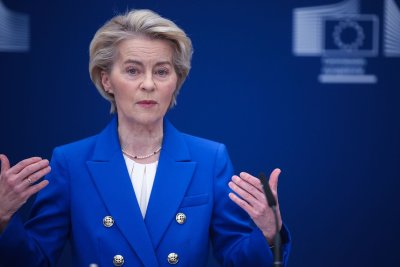
The European Court of Justice Wednesday ruled there was no plausible reason to block the New York Times from getting European Commission President Ursula von der Leyen’s texts with a Pfizer executive. File Photo by Olivier Matthys/EPA-EFE
May 14 (UPI) — The European Court of Justice Wednesday ruled there was no plausible reason to block The New York Times from getting European Commission President Ursula von der Leyen’s texts with a Pfizer executive.
The commission blocked the texts from being released to the newspaper, claiming it did not hold them.
“The Commission decision refusing a journalist of The New York Times access to the text messages exchanged between President von der Leyen and the CEO of Pfizer is annulled,” the court ruling said.
The court said Matina Stevi, a journalist with The New York Times, requested access to all text messages between von der Leyen and Pfizer CEO Albert Bourla between Jan. 1, 2021, and May 11, 2022.
The texts were secret messages before a multi-billion-dollar vaccine deal was reached between the European Union and Pfizer.
The commission rejected the request for the texts on the grounds that the commission did not hold the requested documents.
But the court ruling said Stevi and The New York Times “succeeded in rebutting the presumption of non-existence and of non-possession of the requested documents.”
The court added that the commission “has not given a plausible explanation to justify the non-possession of the requested documents.”
The court found the commission should have provided a more detailed explanation on why the documents were withheld.
The commission has the right to appeal the decision.
“The commission will now closely study the General Court’s decision and decide on next steps. To this effect, the Commission will adopt a new decision providing a more detailed explanation,” it said in a statement.
“Transparency has always been of paramount importance for the commission and President von der Leyen. We will continue to strictly abide by the solid legal framework in place to enforce our obligations.”
HEC Paris Business School law professor Alberto Alemanno said the court decision would enhance accountability for EU leaders.
“This judgment provides a fresh reminder that the EU is governed by the rule of law, with its leaders subject to the constant scrutiny of free media and of an independent court,” Alemanno said.
Dutch MEP Raquel Garcia Hermida-van der Walle called the court decision a “slam dunk for transparency.”
“People just want and are allowed to know how decisions are made, it is essential in a democracy. Even if it was done over a text message,” she said.